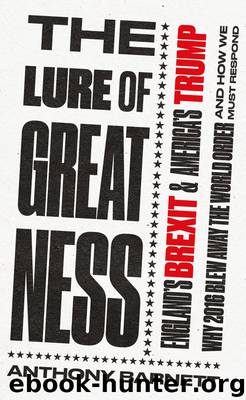The Lure of Greatness by Anthony Barnett

Author:Anthony Barnett [Barnett, Anthony]
Language: eng
Format: epub
ISBN: 9781783524532
Publisher: Random House
Published: 2017-06-08T04:00:00+00:00
Notes
These notes, with live links, can be found at www.unbound.com
1 Tony Blair, A Journey, London, 2011, p. xxvii.
2 Colin Crouch, Post-Democracy, Cambridge, 2004.
3 http://news.bbc.co.uk/nol/shared/vote2005/html/england.stm
21
From Churchillism to Thatcherism
I have looked at the way Brexit was a national vote of England. Then at how England’s nationalism is locked within Britain, a union now challenged by Scotland, and how their unhappiness drove the English to blame Brussels for their discontent. The Brexit that resulted has been defined by Prime Minister May. She seeks to unify the spirit of both the Leave and Remain campaigns in a Big Britishness that is improbable internationally and unsustainable internally – because its constitutional claims seek to roll back time itself. The national question is framed by the constitution and in Britain’s case its 300-year settlement is broken across its parts – the Cabinet, the Commons, the Lords, the civil service, local government – as well as between the nations of the Union. Today, its different nations are now on separate paths, while its exaggerated claims of absolute sovereignty no longer outshine the attraction of a democratic citizens’ constitution. The cause of this undoing was political: New Labour radically decentralising the ramparts of the British state while turning the central turret into an autocracy. From the centre Blair took the country into an illicit, unwanted and stupid war which it lost, in the process undermining the consent that was fundamental to the entire edifice.
How could such a story have come about? Only if we can answer this, can we be confident of the need to close the book of the British state and open a new and better relationship to a now networked world. The answer runs through Britain’s post-war history and goes back to May 1940, when Churchill took office after Labour called for him to lead the war against Nazism. The Labour Party’s leader Clement Attlee told his supporters: ‘Life without liberty is not worth living. Let us go forward and win’, as he took them into the wartime coalition. He himself became Churchill’s deputy. Significantly, ‘liberty’ is no longer a word familiar to the lips of Labour leaders. After the war, Attlee won the 1945 election, to lose to Churchill in 1951. Churchill left office only in 1955, aged eighty. It was a joint fifteen years, dominated by the two of them. To give you an idea of the cross-class nature of the coalition period, the head of the country’s largest trade union, the Transport and General Workers, Ernest Bevin, became minister of labour from 1940 to 1945, to oversee the conscription of the workforce into the war effort. He then became foreign secretary until 1950, aiding the creation of NATO and insisting that Britain make its own atomic bomb – ‘We’ve got to have the bloody Union Jack flying on top of it’ – which was done in secret from parliament but not from Churchill.
In 1939, Great Britain went into the war as a self-confident empire, in alliance with France and with far greater resources than Nazi Germany.
Download
This site does not store any files on its server. We only index and link to content provided by other sites. Please contact the content providers to delete copyright contents if any and email us, we'll remove relevant links or contents immediately.
| Anthropology | Archaeology |
| Philosophy | Politics & Government |
| Social Sciences | Sociology |
| Women's Studies |
The Secret History by Donna Tartt(16635)
The Social Justice Warrior Handbook by Lisa De Pasquale(11490)
Thirteen Reasons Why by Jay Asher(7794)
This Is How You Lose Her by Junot Diaz(5779)
Weapons of Math Destruction by Cathy O'Neil(5040)
Zero to One by Peter Thiel(4828)
The Myth of the Strong Leader by Archie Brown(4792)
Promise Me, Dad by Joe Biden(4451)
Beartown by Fredrik Backman(4423)
Stone's Rules by Roger Stone(4418)
How Democracies Die by Steven Levitsky & Daniel Ziblatt(4401)
The Fire Next Time by James Baldwin(4345)
100 Deadly Skills by Clint Emerson(4081)
A Higher Loyalty: Truth, Lies, and Leadership by James Comey(4035)
Rise and Kill First by Ronen Bergman(4014)
The David Icke Guide to the Global Conspiracy (and how to end it) by David Icke(3885)
The Farm by Tom Rob Smith(3873)
Secrecy World by Jake Bernstein(3785)
The Doomsday Machine by Daniel Ellsberg(3734)
